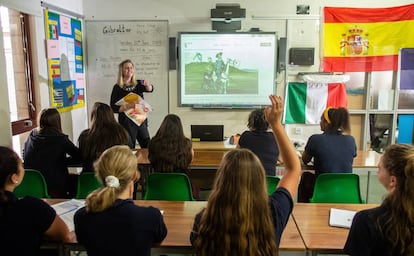Why the Spanish language is losing ground in Gibraltar
Younger generations are using English almost exclusively, a fact educators blame partly on social media


Guy can quote entire passages from Cervantes’ Don Quijote and works by Shakespeare with equal ease. He reads, speaks and enjoys both Spanish and English, like many other citizens of Gibraltar. His real passion, though, is the work of Spanish poet Federico García Lorca, which he reads out to school children on both sides of the border separating Spain from the British overseas territory.
My mother says she thinks in Spanish, but I think in English
Jade Romero, 17
Children in Gibraltar are losing their interest in Spanish and “Facebook is to blame,” says Guy, noting that kids no longer spend as much time playing on the streets as they used to. “Children haven’t been using Spanish for a long time now,” confirms Olivero, the retired owner of a bar on Casemates Square.
Spanish never disappeared from Gibraltar. On the streets, it remained the main language even after the territory was captured by Anglo-Dutch forces and ceded to Britain in 1713. The economy flourished, and those who saw in it a chance to make their fortunes – Genoese, Maltese, Jewish and Spanish entrepreneurs – agreed that communication would be easier for everyone in Spanish.
“If the Gibraltar Chronicle, the newspaper of record, had a circulation of 500 in 1890, El Calpense and El Anunciador, its direct competitors in Spanish, sold by the thousands,” explains Lionel Cipollina, a linguist and the outgoing president of the Cross-Frontier Group, a collective of business and trade unions from both sides of the border.
Cipollina is one of the first people to have sounded the alarm about the fact that young Gibraltarians are using Spanish less and less these days. He also notes that after every affront to Gibraltar’s sovereignty – the overseas territory and the surrounding waters are the subject of an ongoing dispute between British and Spanish authorities – there is a local reaction favoring English over Spanish.
This is a language that is part of Gibraltar’s identity
Pie Sánchez, Spanish teacher
“The language has become politicized. Many politicians see it as a bad thing for Spanish to be lost, but they dare not launch policies that could be seen as going against English,” he adds. “Gibraltar wants to keep being bilingual, but even if the political will is there, we’re coming late to this problem.”
Jade, Ashlyn and other girls at Gibraltar’s Westside School say their grandparents chide them for speaking to them in English. “My grandmother asks me to speak to her in Spanish, so the language won’t get lost, but among ourselves we always speak in English,” says Jade Romero, 17. “My mother says she thinks in Spanish, but I think in English.”
Pie Sánchez, a native of Gibraltar and head of the Spanish department at Westside School, blames the loss of Spanish on satellite TV and social media. “People used to watch [Spanish TV channels] Canal Sur or La 1. To me, it will always be Pipi Calzaslargas, not Pippi Longstocking, and La abeja Maya, not Maya the Bee. But Instagram, Twitter and Facebook use the English versions.”
Students in Gibraltar take two hours a week of Spanish from the ages of 12 to 16. This has been expanded in other stages of compulsory education. “The government has realized that Spanish is being spoken infrequently and poorly,” says Sánchez. “Yet this is a language that is part of Gibraltar’s identity.”
English version by Susana Urra.
Tu suscripción se está usando en otro dispositivo
¿Quieres añadir otro usuario a tu suscripción?
Si continúas leyendo en este dispositivo, no se podrá leer en el otro.
FlechaTu suscripción se está usando en otro dispositivo y solo puedes acceder a EL PAÍS desde un dispositivo a la vez.
Si quieres compartir tu cuenta, cambia tu suscripción a la modalidad Premium, así podrás añadir otro usuario. Cada uno accederá con su propia cuenta de email, lo que os permitirá personalizar vuestra experiencia en EL PAÍS.
¿Tienes una suscripción de empresa? Accede aquí para contratar más cuentas.
En el caso de no saber quién está usando tu cuenta, te recomendamos cambiar tu contraseña aquí.
Si decides continuar compartiendo tu cuenta, este mensaje se mostrará en tu dispositivo y en el de la otra persona que está usando tu cuenta de forma indefinida, afectando a tu experiencia de lectura. Puedes consultar aquí los términos y condiciones de la suscripción digital.








































